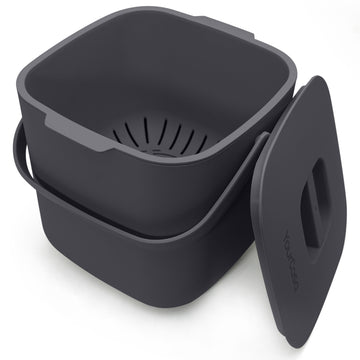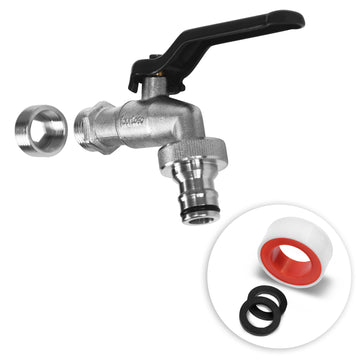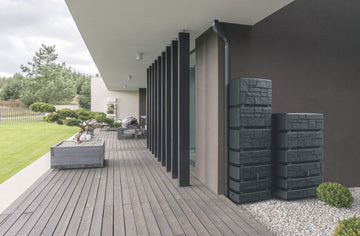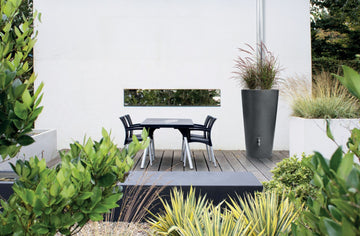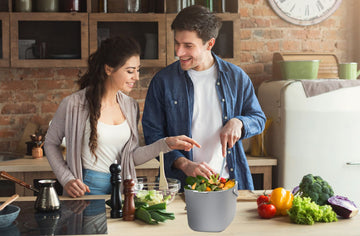
You may not have known it until now, but organic waste is so much more than just a byproduct of your kitchen and garden. Composting can turn it into nutrient-rich compost - and this has numerous benefits. When you compost, you recycle organic waste and reduce your carbon footprint. Using compost in your garden also keeps your soil healthy and ensures that your plants grow happily.
What is composting? Composting is the process of naturally decomposing organic materials such as vegetable scraps, yard waste and leaves into compost, a rich, soil-like soil amendment. Microorganisms, insects and fungi break down the waste. Heat, moisture and oxygen speed up the process. The end product, compost, improves soil structure, promotes water retention and enriches the soil with essential nutrients. Composting reduces the amount of organic waste you produce and helps reduce landfill pollution by providing an environmentally friendly alternative to waste disposal.
At YourCasa.de you will find everything you need for the composting process . Whether you are looking for a practical kitchen compost bin to dispose of daily food scraps in an environmentally friendly way, or you need a robust garden composter for larger quantities of garden waste - our product range offers the right solution for every need. If you are looking for stylish trash cans that fit seamlessly into your home or garden aesthetic, you have come to the right place.
What is organic waste and why is it important?
Biowaste includes all organic waste that is generated in households and gardens . Fruit and vegetable peelings, coffee grounds and tea bags in the kitchen; leaves, green waste and flower remains in the garden. All of this is organic waste that is generated in almost every household and is classified as biowaste. These materials are biodegradable and can easily be converted into useful fertilizer through composting.
And that's more important than you might think - because in Germany, households produce millions of tons of organic waste every year. According to NABU, this amounts to around 67 kilograms per person per year. If this waste ends up in landfills, it not only causes extra work, but also the formation of methane, a greenhouse gas that is much more potent than CO₂. If you compost your organic waste, you reduce global methane emissions and protect the climate . And not only that: you also transform your organic waste into a valuable soil improver that promotes soil health and plant diversity in your garden.
How is compost made from organic waste?
The composting process is actually a fairly complex biochemical process - but we'll spare you the details here. Simply put, it turns organic waste into nutrient-rich soil additive - through the natural decomposition of organic materials. This happens through the activity of tiny microorganisms that live in optimal conditions of moisture, oxygen and heat and break down the organic waste.
You can easily start the whole process yourself. Start by collecting organic waste such as kitchen scraps and garden waste . You then put these in a YourCasa composter , where they are regularly turned and constantly ventilated to promote the decomposition process.
Our kitchen composters , for example, are specifically designed to collect and prepare organic waste directly in the kitchen, making it easier for you to transfer it to larger composting systems. YourCasa's garden composters , on the other hand, offer a robust and practical solution for composting larger quantities of garden waste. They are designed to allow efficient ventilation and easy handling.
The following models are particularly popular:
| Product name | Type of composter | Capacity | Special features | Price |
| Compost bin 4L kitchen | Kitchen | 4 liters | Odor-proof lid, including activated carbon filter, compact design | 23,99 € |
| EcoFusion | Garden | 450 litres | Weatherproof, robust, easy installation without tools | 74,99 € |
In the kitchen composter category you also have a large selection of many other models, including:
| Product name | Type of composter | Capacity | Special features | Price |
| Compost bin 7L kitchen | Kitchen | 7 liters | Large capacity, dishwasher safe | 28,99 € |
| Compost bin 6L kitchen | Kitchen | 6 liters | Sustainable, odor-proof | 34,99 € |
| Organic waste bin kitchen 6L with lid | Kitchen | 6 liters | Lid, wall hanging, compact design | 14,99 € |
| Compost bin kitchen real wood stainless steel | Kitchen | 4 liters | Elegant design with real wood and stainless steel, dishwasher safe | 39,99 € |
| Organic waste bin kitchen 7L with holder | Kitchen | 7 liters | Practical holder for attachment, including lid, odor-proof, dishwasher-safe | 27,99 € |

What are the benefits of using compost?
Sure, composting is primarily a way to improve the quality of the soil in your garden . Compost improves soil structure, promotes water retention, and provides important nutrients that support plant growth. It can also make plants more resistant to disease and thrive better in different types of soil.
A nice side effect is that compost also plays an important role in environmental protection . Composting organic waste makes more efficient use of valuable resources while reducing environmental impact. Here are some of the key environmental benefits of composting:
- Reducing landfill waste : Composting reduces the amount of organic waste that ends up in landfills, where it would produce methane gas , one of the most potent greenhouse gases.
- Protecting natural resources : If you use compost to improve the soil in your garden, you will need less artificial fertilizers, which are often very energy-intensive and harmful to the environment.
- Promoting biodiversity : Healthy soil enriched with compost supports more diverse flora and fauna.
How can I make my own compost? (Practical instructions)
Composting is much easier than you think. Here is a quick guide on how to make your own compost at home:
- Choose a suitable composter : The compact garden composters from YourCasa are suitable for gardens. If you have less space, for example on the balcony or in the kitchen, you should take a look at the kitchen composters.
- Collect organic waste : Add kitchen and garden waste that doesn't belong in the regular trash bin . Make sure there's a good balance of green (nitrogen-rich) and brown (carbon-rich) materials.
- Layer the materials : Start with a layer of coarse materials at the bottom. This will allow for better ventilation. Then follow with alternating layers of green and brown waste.
- Keep the compost moist : The compost should be moist, but not wet. Spray it with water if necessary.
- Aerate regularly : Turn the compost about once a month to add oxygen.
With a little patience and care, your kitchen and garden waste will be turned into valuable compost in just a few months.
What is not allowed in organic waste and compost?
Not all kitchen and garden waste is suitable for compost. Here is a list of materials you should avoid:
- Meat and fish : Attract pests and can cause unpleasant odors.
- Cooked foods : Can encourage mold growth and pests.
- Dairy products : Slow decomposition and odor development.
- Fats and oils : Slow down the composting process and attract animals.
- Diseased plant material : Can spread diseases in compost.
- Cat litter or dog feces : May contain pathogens.
To avoid problems when composting, you should also follow these tips:
- Keep the compost balanced with a mix of green and brown materials.
- Turn the compost regularly to ensure good aeration.
- Make sure the compost is moist but not too wet.
So what can actually go into the compost? That's an excellent question that we'd be happy to answer for you:
| material | Description | Advantages | type |
| Kitchen waste | Fruit and vegetable scraps, coffee grounds, tea bags | Rich in nutrients, accelerate composting | Green |
| Lawn cutting | Freshly cut grass | High nitrogen content, accelerates the decomposition process | Green |
| leaves | Fallen leaves, especially in autumn | Improves the structure of the compost, binds moisture | Brown |
| Twigs and branches | Woody garden waste | Slow decomposition, provides aeration and structure | Brown |
| Eggshells | Crushed egg shells | Add calcium, help neutralize acid | Brown |
| Coffee grounds | Residues from filter machines and espresso machines | Rich in nitrogen, promotes microbial growth | Green |
| Newsprint | Unprinted paper or paper printed with soy ink | Carbon source, helps regulate moisture | Brown |
| Garden waste | Cut flowers, vegetable plant remains | Contains important nutrients for compost | Green |

Conclusion: The importance of organic waste and composting for a sustainable future
As you can see, composting offers an incredible number of advantages , some of which are not so obvious at first glance. Or did you know that you yourself can ensure that our atmosphere is polluted with significantly less methane gas?
So it's high time you equipped your home or garden with a composter from YourCasa . There is more than enough choice. If you have a lot of space and a large garden, you should opt for a garden composter. If your space is limited or you just want to compost a little more comfortably, a small kitchen composter is definitely the right choice. What are you waiting for?

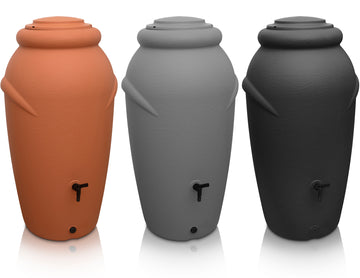
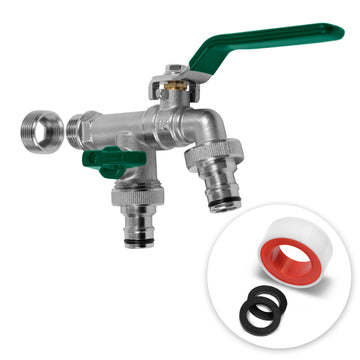
![Drei hohe YourCasa Regentonne 240 Liter [Wellen-Design] - Frostsicher & UV-beständige Gartentöpfe in den Farben Schwarz, Grau und Terrakotta, jeweils mit Drainagesystem für nachhaltige Bewässerung.](http://yourcasa.de/cdn/shop/files/ohnelogo_b8aeecac-557e-4106-a999-e77dcd160209.jpg?v=1707130230&width=360)
